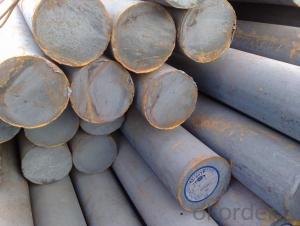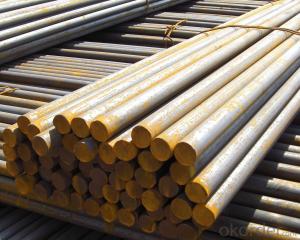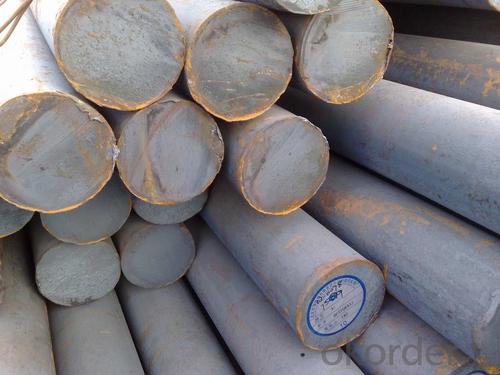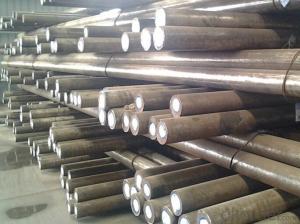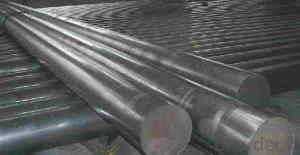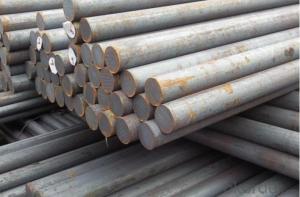Special Steel AISI 5140 Mild Carbon Steel
- Loading Port:
- China main port
- Payment Terms:
- TT or LC
- Min Order Qty:
- 25 m.t.
- Supply Capability:
- 10000 m.t./month
OKorder Service Pledge
OKorder Financial Service
You Might Also Like
Item specifice
The details of our Steel
1. Produce Standard: as the GB, AISI, ASTM, SAE, EN, BS, DIN, JIS Industry Standard
2. Produce processes: Smelt Iron -EAF smelt Billet - ESR smelt Billet -Hot rolled or forged get the steel round bar and plate
3. Heat treatment:
Normalized / Annealed / Quenched+Tempered
4. Quality assurance:
All order we can received Third party inspection, You can let SGS, BV,.. and others test company test and inspect our products before Goods shipping.
Product information
Chemical Composition(GB)%
C | Si | Mn | Cr | Ni |
0.37-0.44 | 0.17-0.37 | 0.50-0.80 | 0.80-1.10 | ≤0.30 |
Heat Treatment
Item | Temperature ℃ | Hardness |
Normalizing | 850-870 | 179-229HB |
Characterstics: Which has the best comprehensive mechanical properties
Applications
1.Can be used for drawing die and plastic mould | |||
2.Can be used for middle and small punch |
Main product
Plastic Mould Steel
DIN 1.2311,1.2738,1.2083,1.2316 etc.
AISI P20,P20+Ni,420 etc.
JIS SUS420J2
Hot Work Steel
DIN 1.2344,1.2343,1.2367,1.2365,1.2581,1.2713 etc.
AISI H13,H11,H10,H21, etc.
JIS SKD61,SKD6,SKD5,SKT4 etc.
Cold Work Steel
DIN 1.2739, 1.2601, 1.2080, 1.2436, 1.2631, 1.263, 1.2510, 1.2327 etc.
AISI D2, D5, D3, D6, A8, A2, O1 etc.
JIS SKD10, SKD11, SKD1, SKS3 etc.
High Speed Steel
DIN 1.3343, 1.3243, 1.3247, 1.3355 etc.
AISI M2, M35, M42, T1 etc.
JIS SKH51, SKH35, SKH59, SKH2 etc.
Alloy Structural Steel
DIN 1.7035,1.6511,1.7220,1.7225 etc.
AISI 5140, 4340, 4135, 4140 etc.
JIS SCr440,SNCM439,SCM435,SCM440 etc.
Stainless & Carbon Steel or Others
DIN 1.4125,1.1191 etc
AISI 440C,1045, 1020 etc.
JIS SUS440C,S45C etc
Product show

Workshop show

- Q:Can special steel be used in the musical instrument manufacturing industry?
- Yes, special steel can be used in the musical instrument manufacturing industry. It can be utilized for various components of musical instruments, such as strings, keys, and structural parts, to enhance durability, tone quality, and overall performance.
- Q:How does nitriding steel improve hardness and wear resistance?
- Nitriding steel improves hardness and wear resistance by introducing nitrogen into the surface of the material. This process forms nitrides, which are hard compounds that increase the surface hardness of the steel. Additionally, the nitrides create a protective layer that enhances the material's resistance to wear, erosion, and corrosion.
- Q:What are the different surface finishing techniques for special steel parts?
- There are several surface finishing techniques that can be used for special steel parts to enhance their appearance, protect them from corrosion, and improve their overall performance. Some of the commonly used techniques include: 1. Polishing: This technique involves using abrasives to create a smooth and glossy surface on the steel part. It not only enhances the aesthetic appeal but also improves the part's resistance to corrosion. 2. Plating: Plating is a process that involves depositing a layer of metal onto the surface of the steel part. Common plating options include chrome, nickel, and zinc. This technique provides additional protection against corrosion, improves wear resistance, and can also give the part a desired color or finish. 3. Powder coating: Powder coating is a method where a dry powder is applied to the surface of the steel part electrostatically and then cured under heat. The powder melts and forms a hard, durable, and attractive coating. This technique provides excellent resistance to corrosion, impact, and chemicals. 4. Anodizing: Anodizing is primarily used for aluminum, but it can also be applied to some special steel parts. It involves creating a controlled oxide layer on the surface of the part, which enhances its corrosion resistance, improves its appearance, and can provide an insulation layer. 5. Passivation: Passivation is a chemical process that removes free iron and other contaminants from the surface of the steel part. It helps prevent corrosion and improves the part's resistance to staining or discoloration. 6. Heat treatment: Heat treatment is a process that involves heating and cooling the steel part to alter its physical and mechanical properties. It can improve hardness, strength, and toughness, while also providing a desired surface finish. 7. Electropolishing: Electropolishing is an electrochemical process that removes a thin layer of metal from the surface of the steel part. It helps eliminate surface imperfections, smoothens the part, and improves its corrosion resistance. It is important to choose the appropriate surface finishing technique based on the specific requirements of the special steel part, such as its function, desired appearance, and environmental conditions it will be exposed to.
- Q:What are the different methods of surface cleaning for special steel?
- There are several different methods of surface cleaning for special steel, including mechanical methods such as abrasive blasting or grinding, chemical methods like pickling or passivation, and electrochemical methods such as electrocleaning or electropolishing. Each method has its own advantages and is chosen based on the type of contamination or surface condition that needs to be addressed.
- Q:How is high-temperature stainless steel used in the production of gas turbines?
- High-temperature stainless steel is used in the production of gas turbines due to its excellent resistance to corrosion and oxidation at elevated temperatures. It is primarily used to manufacture critical components like turbine blades, vanes, and combustion chambers, which are exposed to extreme heat and pressure inside the turbine. The high-temperature stainless steel ensures durability, performance, and longevity of gas turbines, enabling them to operate efficiently in demanding conditions.
- Q:How does special steel withstand high-velocity impacts?
- Due to its unique properties and composition, special steel possesses the capability to endure high-velocity impacts. A crucial factor contributing to this capability is its high strength and hardness, which allows it to withstand extreme forces without deforming or fracturing. Additionally, special steel often incorporates alloying elements like chromium, molybdenum, nickel, and vanadium, which enhance its exceptional toughness and resistance to impacts. Furthermore, special steel frequently undergoes heat treatment to improve its mechanical properties. This involves processes like quenching and tempering that modify the steel's microstructure, resulting in a refined and strengthened structure. This heat treatment also augments the steel's capacity to absorb and disperse energy during high-velocity impacts, thereby lowering the risk of failure. Moreover, special steel is frequently tailored with specific alloys and compositions to optimize its performance in specific applications. For instance, certain grades of steel are engineered specifically for armor applications, where they must endure high-velocity impacts from projectiles. These steels may incorporate additional elements like boron or titanium, further enhancing their ability to resist penetration and deformation under extreme loads. In conclusion, special steel's ability to withstand high-velocity impacts can be attributed to its high strength, hardness, toughness, and impact resistance. Its distinctive composition, heat treatment processes, and targeted design render it a dependable choice for applications where impact resistance is of utmost importance.
- Q:How does special steel ensure product traceability?
- Special steel ensures product traceability through the implementation of unique identification codes, comprehensive record-keeping systems, and advanced tracking technologies. These measures enable manufacturers to accurately track and trace the entire lifecycle of the steel, from raw materials to the finished product. This ensures that any issues or defects can be identified and addressed promptly, enhancing quality control and customer satisfaction.
- Q:How does special steel contribute to the food processing industry?
- Special steel, with its unique properties and characteristics, plays a crucial role in the food processing industry. It is widely used in various equipment and machinery for processing, handling, and packaging food products. Special steel's corrosion resistance, high strength, and durability ensure that the equipment remains hygienic, safe, and reliable throughout its lifespan. Additionally, special steel's heat resistance makes it suitable for applications that involve high temperatures such as ovens, grills, and industrial cookware. In summary, special steel's contribution to the food processing industry lies in its ability to provide the necessary strength, resilience, and hygiene required for efficient and safe food production and processing.
- Q:What are the different mechanical properties of special steel?
- Special steels have a variety of mechanical properties that make them unique and suitable for specific applications. Some of the key mechanical properties of special steel include high strength, excellent toughness, good wear resistance, and superior corrosion resistance. High strength is one of the most important properties of special steel. It allows the material to withstand heavy loads and stress without deformation or failure. This property makes special steel suitable for applications where structural integrity and durability are critical, such as in the construction of buildings, bridges, and machinery. Another significant mechanical property of special steel is its toughness. Toughness refers to the ability of a material to absorb energy and resist fracture under impact or sudden loads. Special steels with high toughness are essential for applications that involve dynamic and high-impact forces, such as in the manufacturing of tools, gears, and machinery components. Wear resistance is another important mechanical property of special steel. It refers to the ability of a material to resist damage and deterioration due to friction, abrasion, or erosion. Special steel with good wear resistance is commonly used in applications where it will be subjected to harsh conditions or repetitive mechanical actions, such as in the production of cutting tools, dies, and molds. Superior corrosion resistance is a valuable mechanical property of special steel, especially in environments where exposure to moisture, chemicals, or extreme temperatures is likely. Special steels with high corrosion resistance can withstand the deteriorating effects of oxidation, rust, and chemical reactions, making them suitable for applications in industries such as marine, chemical, and oil and gas. In summary, special steels possess a range of mechanical properties that set them apart from conventional steels. High strength, excellent toughness, good wear resistance, and superior corrosion resistance are some of the key mechanical properties that make special steel a preferred choice for various industrial applications.
- Q:What are the challenges in surface treating special steel?
- Surface treating special steel can present a range of challenges due to the unique properties and composition of the material. Some of the main challenges include: 1. Hardness: Special steels often have a high level of hardness, making it difficult to achieve effective surface treatment. Traditional methods like heat treatment or chemical processes may not be sufficient to alter the surface properties without affecting the core strength. 2. Surface contamination: Special steels are susceptible to contamination during the surface treatment process. Even small traces of impurities or foreign materials can compromise the integrity of the treated surface. It is crucial to have a controlled environment and use clean equipment to minimize contamination risks. 3. Complex alloy composition: Special steels are typically alloyed with various elements to enhance their specific characteristics, such as corrosion resistance or high temperature stability. This complex composition can make it challenging to find suitable surface treatment techniques that can effectively modify the surface properties without negatively impacting the alloy's overall performance. 4. Adhesion and coating uniformity: Achieving good adhesion and coating uniformity on special steel surfaces can be problematic. The surface characteristics and microstructure of special steels can make it challenging for coatings or treatments to adhere properly and evenly. Special attention must be given to surface preparation and the selection of appropriate primers or coatings to ensure good adhesion and uniformity. 5. Heat sensitivity: Some special steels may be sensitive to heat during surface treatment processes. Excessive heat exposure can alter the material's properties, leading to structural changes or even deformation. Careful temperature control and suitable cooling methods need to be employed to prevent any undesirable effects on the steel during the surface treatment process. 6. Cost: Surface treating special steel can be a costly process due to the specialized equipment, materials, and expertise required. Additionally, the challenges mentioned above can increase the complexity and time required for surface treatment, leading to higher costs. It is essential to consider these factors when planning and budgeting for surface treatment on special steel components.
1. Manufacturer Overview |
|
|---|---|
| Location | |
| Year Established | |
| Annual Output Value | |
| Main Markets | |
| Company Certifications | |
2. Manufacturer Certificates |
|
|---|---|
| a) Certification Name | |
| Range | |
| Reference | |
| Validity Period | |
3. Manufacturer Capability |
|
|---|---|
| a)Trade Capacity | |
| Nearest Port | |
| Export Percentage | |
| No.of Employees in Trade Department | |
| Language Spoken: | |
| b)Factory Information | |
| Factory Size: | |
| No. of Production Lines | |
| Contract Manufacturing | |
| Product Price Range | |
Send your message to us
Special Steel AISI 5140 Mild Carbon Steel
- Loading Port:
- China main port
- Payment Terms:
- TT or LC
- Min Order Qty:
- 25 m.t.
- Supply Capability:
- 10000 m.t./month
OKorder Service Pledge
OKorder Financial Service
Similar products
New products
Hot products
Hot Searches
Related keywords
